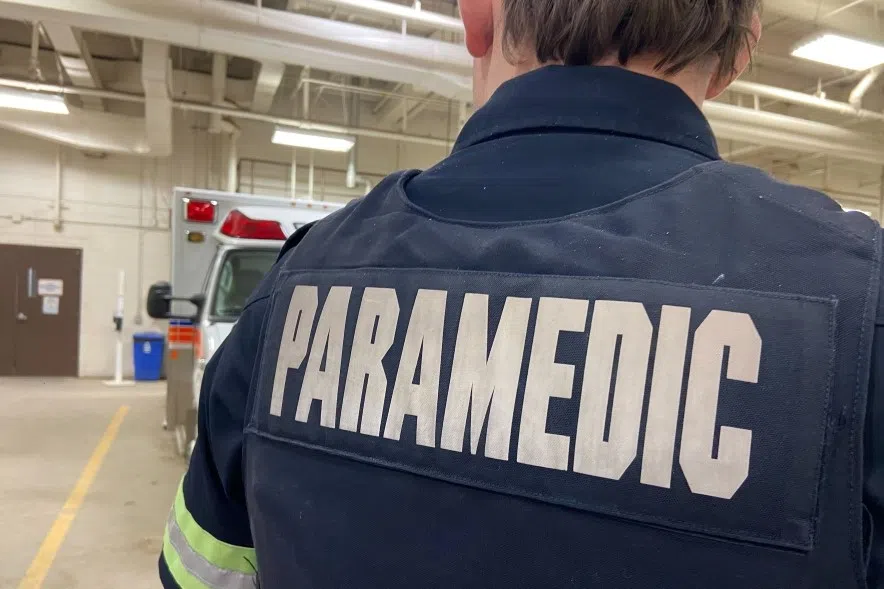Now is the perfect time to thank a paramedic.
Paramedic Services Week runs from May 19-25. This year’s national theme is “We care for everyone.”
Jennifer Larre, President of the Paramedic Services Chiefs of Saskatchewan and owner and operator of WestMed Paramedics, joined The Evan Bray Show this week to chat about what paramedics are dealing with on the frontlines and how people can celebrate these essential workers.
Read more:
- Regina paramedics hoping to make wishes come true for sick kids in Sask.
- ‘Shortage of paramedics entering EMS as a career in Sask.’: SHA
- Vanscoy woman turns to firefighters after ambulance for daughter doesn’t arrive
Listen to the full interview here:
The following transcript has been edited for length and clarity.
Evan Bray: It’s Paramedic Services week. What’s the importance of this?
Jennifer Larre: It’s all about the work that paramedics do. It’s a profession that you get in because I believe you really have a calling to it. It’s not an easy one to enter, but it’s one that once you’re in, you’re part of a family, that’s for sure.
One thing about paramedics is we’re usually not thought about until we’re needed. Until you’re in the situation where a paramedic is really needed and we’re in your house and helping you, we’re not always thought about. So it’s nice to be able to give that appreciation for the job that the paramedics do.
Bray: Has the job become more complex over the years?
Larre: Yes and the scope of skills is also increasing. So schooling is getting a bit longer. We have some more training, which is always great, but then there’s a higher level of care that can be provided. That puts a little more pressure on paramedics because you’re out in the field with your partner and it’s just the two of you to lean on each other.
Bray: How have you seen this job change in your time working as a paramedic?
Larre: Saskatchewan is one of the provinces that’s leading in what paramedics can do on scene for the patient. When I first started, you got to the patient, checked them out and had a general idea of what was happening. We could do a few things for them, but our end goal was to get them to the hospital quickly.
Now it’s changed that we sit on scene and we go through our full scope and we do everything we can for the patient, which is great because they’re getting that care more quickly, and we can continue that care until we get them to the hospital.
Bray: Are there unique challenges,depending on where you are in the province?
Larre: Many are the same right now. We’re struggling with getting paramedics into the profession, as well as retaining them. The province has done a lot with the new bursaries that have been given out over the last two years but we find that the paramedic course is a bit of a stepping stone to many other professions, because we can’t offer the work-life balance that other professions have.
We’re 24 hours on call for five days in a row. It doesn’t offer much relief when it’s busy.
Bray: What is the process of filling shortages, especially in some of the rural areas? Is part of it trying to recruit people who already live in those areas?
Larre: There are many services that will go around to high schools and do presentations. They’ll go to Saskatchewan Polytech and present about their service, about their area and try to get those people.
The homegrown ones are the ones that you can usually count on staying in the area so there’s definitely a push to try to find those people.
It’s a bit of a calling. It doesn’t seem like it’s a profession that you can just go to talk to people and convince them to try out.
Bray: This spring, your organization, the Paramedic Services Chiefs of Saskatchewan, was disappointed with the provincial budget. Was there a certain segment of funding you were looking for? What was missing?
Larre: Unfortunately, a big part that’s missing for us is an operational increase. With the price of everything going up, it’s really hard to keep ambulances on the road because there’s such a shortage.
With the paramedic positions, they have funded quite a few positions for us, but now we’re kind of at a standstill because the specific ones they gave funding for, we haven’t been able to fill all of them. Some of those positions are in areas of the province that don’t have a very high call volume. Paramedics can go wherever they want right now, so they’re looking for the services that do have those higher call volumes, and tend to go there.
We did get some great news. Minister Lori Carr said that we would be able to look at where the extra funding that was unused and move it around to where it could fit into some of the shortages.
Bray: How are drug overdoses and those types of calls impacting the work that paramedics do?
Larre: The rise of those kinds of calls has been incredible. Paramedics are really tired of doing it. That sounds bad, but it’s just a lot and it just adds on to their work day that much more and they’re serious heavy calls.
Fortunately, we do have the medication to give to reverse that overdose if we can get to the person fast enough. But it’s a heavy call and usually those patients aren’t very happy to see us when they do come out of it and wake up.
Bray: Have we made strides in the industry when it comes to the safety of paramedics? Are we doing a better job of taking care of the safety concerns, both physically and mentally?
Larre: Yes. I think that sometimes we make excuses for why the patients are acting the way that they are. There are some health conditions where patients can get violent, elderly patients that have dementia, things like that.
We know they don’t mean to hurt us, but they may hit or kick. The ones that are affected by drugs and alcohol can get mean. I think we’re doing a better job of calling our partners with the RCMP and different city police services to respond with us and help us with those patients.
The mental health support for paramedics has increased drastically over the past few years. The SHA has done a phenomenal job of making a program specifically for the paramedics in our province. Carr announced that they were giving us extra funding to continue to support that program, because it’s really a couple of people who look over all the paramedics in the province and we need more help.
Bray: What are your closing thoughts?
Larre: Thank your paramedics. They’re saving lives out there and they work hard. They work long hours and we’ve dealt with a lot of difficult things in the industry over the past few years — COVID, very long offloads, delays, fatigue management.
It’s nice to get a little appreciation for what they’ve done. They’re definitely not looking for it, but when it does come their way, they sure appreciate it and it really brightens their day.
Read more:











